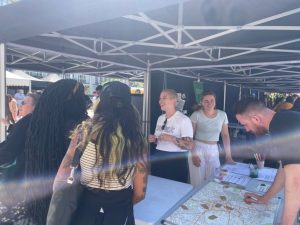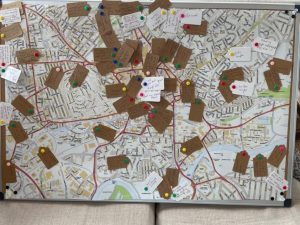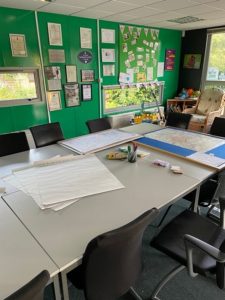June 19, 2024, by lzzre
Learning from fieldwork ‘failure’ – lack of engagement with my community engagement project
Katie Keddie, Geography PhD student
At the time of writing, I am nearly two years into my PhD research, which centres around Nottingham’s environmental transformation, specifically looking out how notions of social justice and place are considered within the city’s journey to carbon neutrality. Procedural justice is extremely pertinent within this: making sure that local people are included in decision making processes and are empowered to have a voice about what happens within the places they live. With this at the forefront of my mind, and with the best will in the world, I set out to plan my ‘community visioning’ workshops aided by the school’s wonderful ‘Engagement Hub’ funding.
My first decision was location. With social justice at the heart of my work, I wanted to support local organisations and use a space that felt welcoming for everyone (not the university, art galleries or other spaces that might feel ‘privileged’ or ‘elite’). I therefore decided to go with Heathfield Community Centre in Basford, home of The Pythian Club and The Chase Neighbourhood Centre in St Ann’s, ran by St Ann’s advice centre. These organisations are both doing incredible work around social justice and community engagement in areas that have high levels of deprivation and inequality.
With rooms booked, workshops planned and public engagement training certificate in hand, I was feeling excited for the prospect of engaging with and co-producing knowledge with community members. I had a really fulfilling and well received trial run of the activities at Green Hustle, which also helped boost my confidence. Flyers were put up in local spaces, on social media and Linkedin; councillors, faith groups, community organisaitons were emailed with information for their networks and sign-up forms.
The day of the first workshop quickly approached. Zero responses on my sign-up form. After a brief panic during which I considered cancelling the event, I thought to myself “It’s fine, people know about it and will come regardless of whether they have signed up using the link”. I carried on my day as planned – quick stop off at Doughnotts to get treats for the community members, to Sainsbury’s to get refreshments, sorting out my maps, making sure I have enough flipchart paper, checking over my activity timings, travel to the space, set up.
I sat in the empty room for around half an hour after the event ‘started’ before deciding that no-one was going to show. I failed. How am I going to explain this in my thesis? Will my supervisors think I am not working hard enough? Does this mean my work doesn’t matter? I’ve wasted the money I was trusted with. What am I going to do with all these donuts?!
My next workshop is in three days time and I am entering it with a certain level of fear and apprehension. This feeling is also bolstered by a negative response I had from a community representative: why am I doing this research? Why am I including communities that have ‘been researched’ before and nothing has come of it? Why am I getting peoples hopes up? While upsetting, these experiences have also encouraged me to be more critical about my work moving forward – people are currently faced with a raft of different and intersecting crises, so is it really fair of me to expect that they will willingly give up their Monday evening to come and talk about the future of their communities when so many lives are entrenched in the present condition?
After a second, more substantial panic, I realised that people’s absence from engagement with this work is telling and rich data in and of itself and will certainly add a level of interest to my methodology chapter! Ultimately I know that these hurdles are going to make me a more reflexive researcher, helping me deal with future ‘failures’ I will no doubt face throughout my career.
No comments yet, fill out a comment to be the first





Leave a Reply